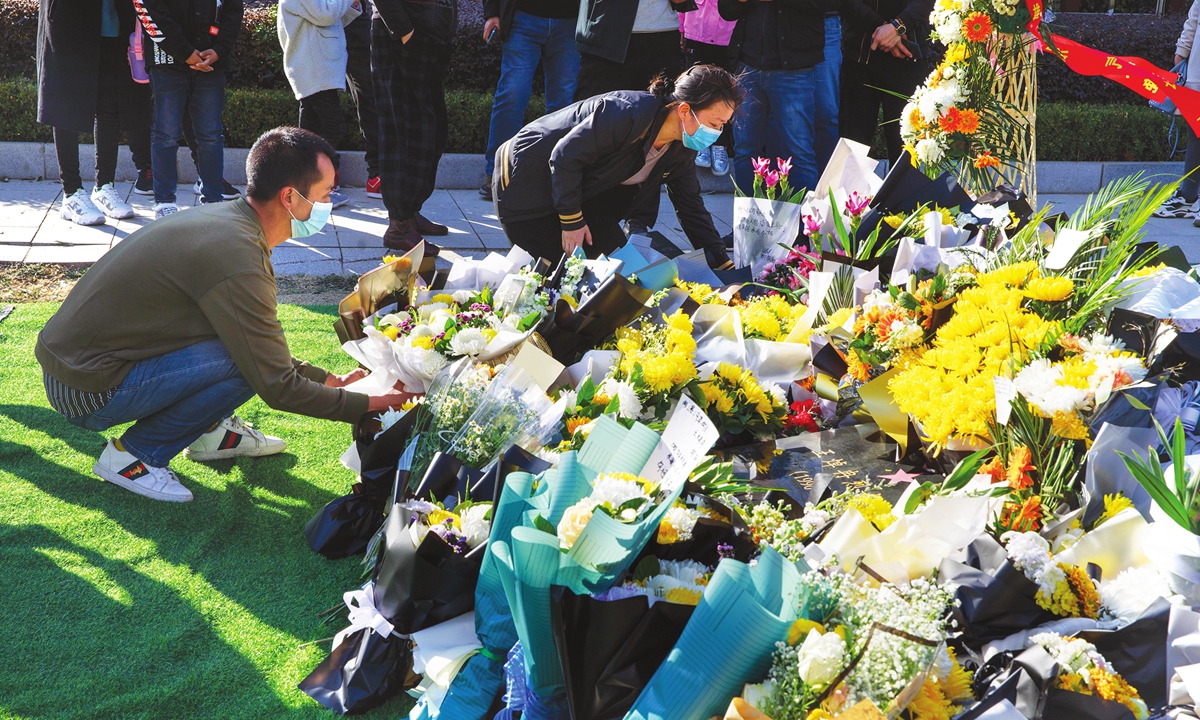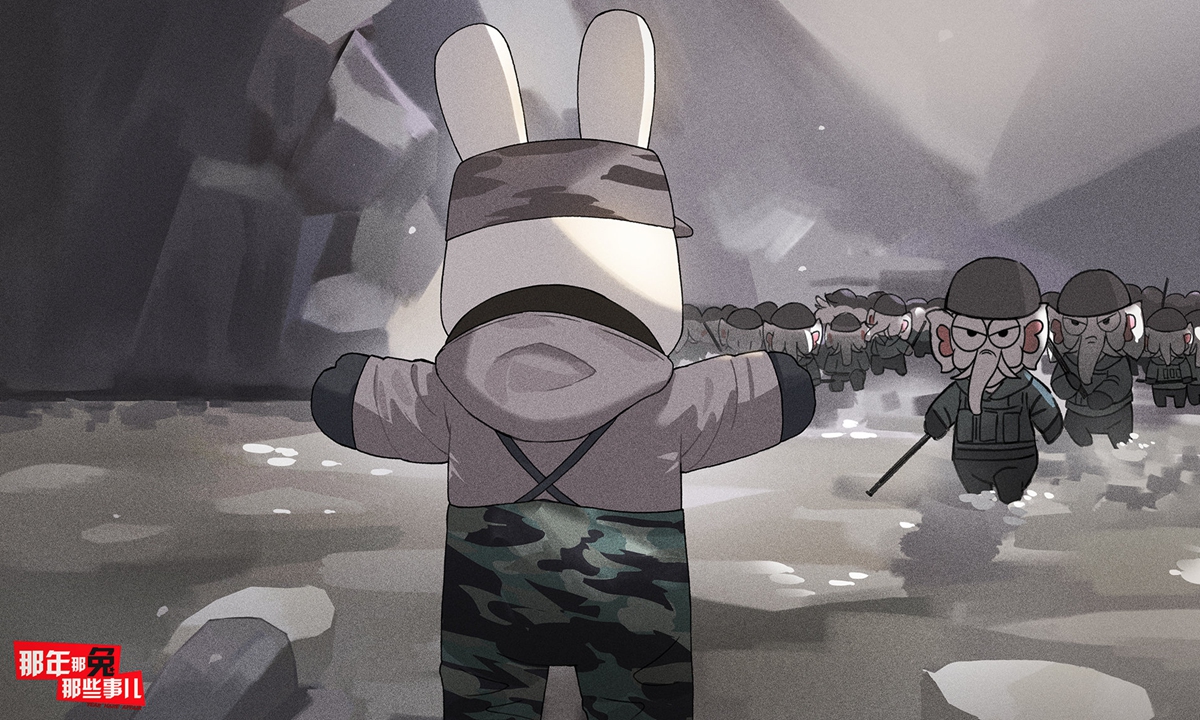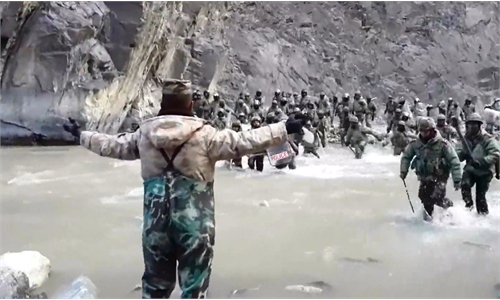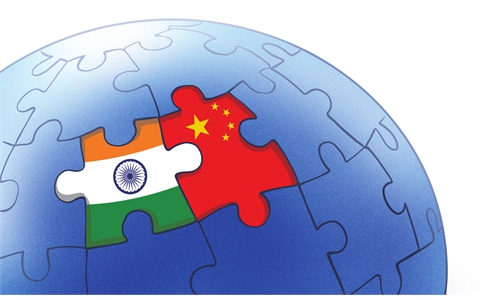
Employees of the martyrs' cemetery in Luohe, Central China's Henan Province, organize bouquets that local residents brought in honor of Wang Zhuoran, 24, who died in the Galwan Valley skirmish with India in June 2020. Photo: VCG
On the first anniversary of the Galwan Valley clash, Chinese netizens honored and expressed gratefulness on social media platforms to Chinese frontier soldiers and officers who had sacrificed their lives in the deadly military clash for defending national sovereignty and territorial integrity, while warning the Indian government not to attempt to provoke fresh conflicts along the border as the South Asian country suffers from the epidemic.
Videos and photos of how four soldiers engaged and fought the Indian military over their illegal trespass in the Galwan Valley Line of Actual Control were re-circulated on Chinese social media on Tuesday, touching the hearts of millions of Chinese netizens.
"Chinese people and history will never forget these heroes in the remote Galwan Valley for protecting the country's sacred borderland in the face of the despicable Indian military. No words can express our deepest respect," a Chinese netizen wrote on Sina Weibo.
Another said that "pure love is only for the motherland. They used every drop of blood to defend every inch of our territory. The four martyrs will forever stay in the country's frontiers and protect Chinese people."
In the video of the Galwan Valley clash released by China, Qi Fabao, the regimental commander from the People's Liberation Army Xinjiang Military Command, along with other PLA soldiers, opened their arms in the river to intercept the Indian soldiers who were trespassing the border.
"If the troop is compared to a sharp sword, the courage and uprightness of soldiers is the blade of the sword. We are not afraid of sacrifice, and we have always held on to the belief that we would rather sacrifice our lives than lose an inch of our territory," Qi said in his first public appearance in early June after his recovery.
Qi was awarded by the Central Military Commission with the title of "Hero Regimental Commander for Defending the Border" and honored with the July 1 Medal by the Communist Party of China Central Committee. Chen Hongjun, one of the four martyrs, was awarded by the Central Military Commission with "Hero to Defend the Dorder," and awarded first-class merit to three other martyrs - Chen Xiangrong, Xiao Siyuan and Wang Zhuoran.
The four martyrs earned wide respect in the country for their courage and bravery. Crowds had visited the martyrs' hometowns where they are buried to pay their respects during the Tomb-sweeping Day in April.
Although one year has passed since the border spat, also believed to be the first deadly military clash between China and India since 1975, India did not learn its lesson and continue to build up its military to provoke another border conflict, while the South Asian country suffers from the COVID-19 epidemic, Chinese experts said.
In addition to infrastructure buildup, the Indian army further strengthened its purchase of military hardware. South Korean firm Hanwha Defense has offered to sell its K21-105 light tank to the Indian army, according to The EurAsian Times on May 12. India inked a $2.42 billion deal with the US for six more advanced P-8I submarine-hunting aircraft, Times of India reported.
Some Chinese observers saw India's actions as a hopeless attempt to divert Indian people's attention from their government's failure to cope with the epidemic, which would result in only unbearable consequences for India.
For one thing, the Indian people will be put into an overwhelming battle against the deadly disease in the face of a rapidly-developing, out-of-control outbreak that has already killed tens of thousands, Zhao Gancheng, director of the Center for Asia-Pacific Studies at the Shanghai Institute for International Studies, told the Global Times on Tuesday.
With oxygen bottles in short supply and a healthcare system on the brink of collapse, diverting attention to a border clash would only worsen the situation, experts noted.
It will further lead to a serious economic recession and a gloomier economic prospect if the Modi administration continues to ignore the virus spread in the country, Zhao said.

A "Year Hare Affair" illustration that depicts a Chinese soldier protects national territory in Galwan Valley skirmish with India in June 2020. Photo: Courtesy of Lin Chao
Some netizens called the behavior of the Indian government which spends its limited resources on military expansion while the Indian people's basic right to subsistence cannot be guaranteed during the epidemic as the biggest disregard for human rights.
It will also accelerate the internal contradictions toward the Modi administration. According to a recent poll carried out among Indian people by Cvoter, Modi's approval rate has dropped dramatically from 65 percent in 2020 to the current 37 percent, a record low in the past seven years since he became Indian prime minister.
Rahul Gandhi, former president of the Indian National Congress, slammed Modi's "seven deadly sins" during his rule. So did the Supreme Court of India, which questioned the current administration's capabilities in handling the COVID-19.
India's military intentions could also severely damage its global image and reputation, some Chinese observers pointed out, as the coronavirus variant detected in India has been spreading to countries in South Asia, Southeast Asia and even to remote Western countries. According to the World Health Organization, the virus variant, initially found in India but now called Delta, has spread to at least 53 countries or regions, and has been deemed as a "variants of concern."



